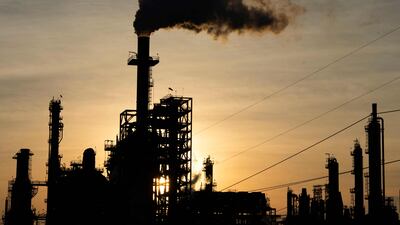The Cop28 summit in Dubai is the most important UN climate change conference in eight years, as the goals of the 2015 Paris Agreement will be evaluated for the first time by world leaders, a senior Spanish officials has told The National.
The agreement set 2023 as the year for a first global stocktake, which will be “the real test to confirm that we can reach 1.5°C in the next decade", said Valvanera Maria Ulargui Aparicio, director general at the Spanish government’s office for climate change.
She was referring to pledges by world leaders to limit the increase in global temperatures to 1.5°C above pre-industrial levels.
The global stocktake is not simply a progress assessment, it represents a “real exercise to look beyond and identify concrete actions that we need to put on the table", she said.
The stocktake will influence the next nationally determined contributions, or NDCs, which outline each country’s plans to cut emissions and adapt to climate change.
“If these national commitments are not ambitious enough, the gap will not be closed,” Ms Ulargui Aparicio said.
She spoke to The National at a conference organised by the European Commission in Brussels aimed at highlighting Europe’s efforts to adhere to the goals of the Paris Agreement.
In a technical report published in September, the UN warned the world was “not on track” to slow global warming to 1.5°C.
“Time is not on our side,” EU Commissioner for Climate Action Wopke Hoekstra said.
The bloc aims to achieve net zero by 2050 and expects to reduce carbon emissions by about 57 per cent by 2030, compared with 1990.
“We feel Cop28 is the opportunity to aim higher than any other Cop before,” said Mr Hoekstra, who plans to present a target of 90 per cent net emission reduction by 2040.
Ms Ulargui Aparicio said the main priority was to reduce greenhouse gas emissions and to commit to them peaking by 2025 at the latest.
'We must be brave'
“We must be very, very brave on energy transition goals,” she said. “If we do not peak fossil fuels this decade, if we do not reduce drastically their consumption and production, it will not be enough.”
Ms Ulargui Aparicio said called for more investment in the green transition in the developing world.
“We need to help Africa and the most vulnerable [countries] with clear, concrete goals, otherwise the rest of the regulatory framework and market improvements will not happen,” she said.
Cop28 is the last chance to make “credible commitments to start bending the curve on fossil fuel-based emissions", Johan Rockstrom, director for the Potsdam Institute for Climate Impact Research, told The National.
“We need to have credible outcomes in Dubai to start reducing emissions from oil, coal and gas,” he said.
Mr Rockstrom called on “big economies” including he US, India, China and the EU to “step up” to tackle the climate crisis.
Speaking during a panel, he said aiming to limit global warming by 1.5°C was “non-negotiable".
“It’s a physical limit where life would cross a number of tipping points that would undermine livelihoods for many people around the world,” he told the panel.
Policymakers and scientists must also be “humble” in the face of the enormity of the task, Mr Rockstrom said.
“We have been powering the economy with fossil fuels for 250 years and now we are transitioning to green energy," he added.
“It is the biggest transition for humankind on planet Earth. We must be humble to that fact."


